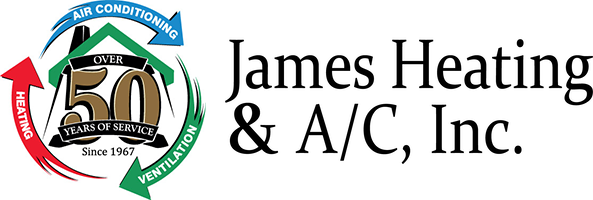Buying your first home is thrilling. You’re probably juggling numerous details about making the right choice. We believe that gaining insight into your future HVAC system is essential. The property’s HVAC system represents a substantial investment and source of potential long-term costs, so being thorough helps all first-time homebuyers.
In this guide, we’ll share seven tips for discovering all there is to know about a home’s heating and cooling system. And if you want a more in-depth opinion from the pros, feel free to call James Heating & A/C, Inc. Our seasoned technicians can help you compare your options with industry insights you won’t find elsewhere.
1. Which Kind of HVAC System Does the Home Use?
Start by clarifying what specific HVAC system the home features. Furnaces tend to last longer compared to air conditioners, and newer types of HVAC equipment like heat pumps feature average life spans longer than ever. Tracking down the make and specific model ensures you have a clear idea of how much maintenance it will require.
2. How Long Ago Was the System Installed?
It’s just as smart to learn how old the HVAC system is when you’re looking at a potential new home. For the most part, HVAC systems last about 10-12 years. Learning its approximate installation date helps you anticipate future maintenance needs or considerations if it might eventually stop working. Older systems may be more vulnerable to problems, so fiscal planning for a replacement unit could be necessary sooner than you thought.
3. What Does the Warranty Cover?
Check if the HVAC system is covered by a warranty. If it is, that’s great news because it can lower maintenance costs. HVAC warranties often cover parts and labor, but the details in each policy will vary. Don’t forget to look into any terms that seem confusing to ensure you understand your coverage and any possible out-of-pocket costs.
4. Has the System Ever Been Professionally Serviced or Maintained?
Next, examine the maintenance history of the HVAC system, if this kind of history is available. This kind of information can demonstrate if there have been regular problems or how often maintenance is performed. You should at least try to track down a history of key tasks such as changing the air filter, which means it enjoyed more regularly scheduled tune-ups.
5. Do You Know Its Energy Efficiency Ratings?
Purchasing a home with a heating and cooling system with high energy efficiency can lead to smaller utility bills and less of an impact on the environment. Check out the seasonal energy efficiency ratio (SEER) ratings for air conditioning as well as the annual fuel utilization efficiency (AFUE) for furnaces. The higher the SEER rating, the more efficient the cooling over the whole season, while strong AFUE ratings indicate that the fuel is more effectively burned for useable heat.
6. Can You Spot Trouble After Completing an Informal Inspection?
Even if you don’t have the know-how of an HVAC technician, you should still inspect the HVAC system yourself. Look for signs of problems that weren’t mentioned by the seller or real estate agent. This includes strange noises, stubborn patches of the house that are too hot or cold and attempts at concealing any serious damage.
7. Is an Experienced HVAC Technician Available to Help?
If you’re still hesitant to make an offer because of the overall state of the HVAC system, it’s never a bad idea to get an assessment and recommendation from experienced HVAC professionals. They will be much more likely to catch things you may not know about, like leaks in the refrigerant, bad electrical connections or damaged ductwork.
A Consultation with James Heating & A/C, Inc Simplifies Your Home-Buying Journey
Selecting your first home should be thrilling, and James Heating & A/C, Inc can ensure it stays that way. Reach out with us at 336-853-6070. We can talk about how our HVAC services ease your mind, giving you what you need to dive into home-ownership with confidence.

